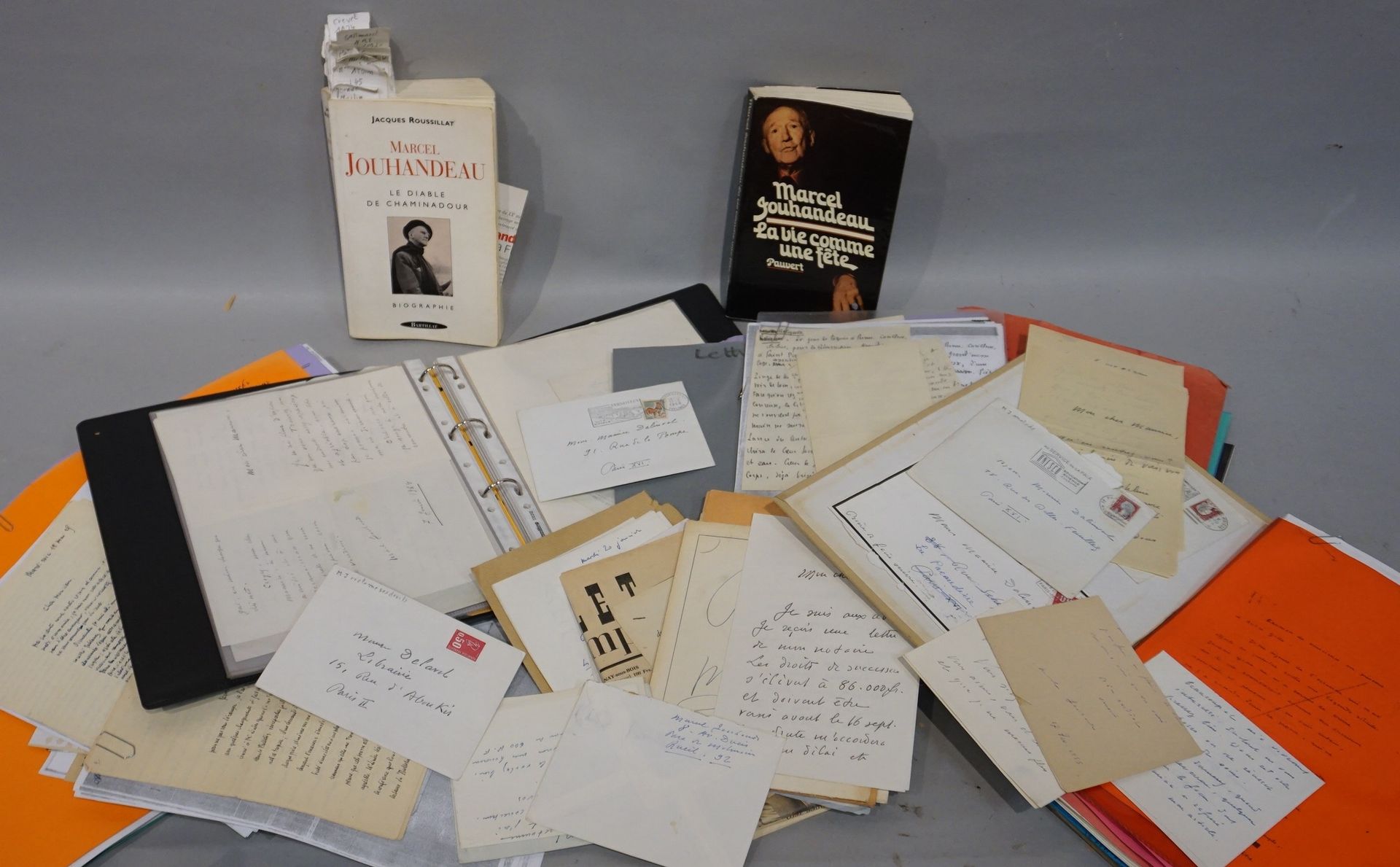Description
JOUHANDEAU (Marcel). Long correspondence from Marcel Jouhandeau to Maurice Dalinval (1964 to 1973), who was his former pupil, and kept a very long friendship with him all his life, he considered him as his own son. - Correspondence Robert LEVESQUE. Correspondence from R. Levesque to Marcel Jouhandeau, with letters and photocopies of duplicate letters. R. Levesque, who in the 30's became a very close friend of André Gide, was Marcel Jouhandeau's pupil at the Saint Jean de Passy school in the 4th and 3rd grades during the school years 1922 to 1924. Very attached to his former teacher, to whom he had more than just admiration, the teenager, who was 15 and a half years old and about to enter the second year of high school, continued to maintain a close emotional relationship and regular correspondence with Marcel Jouhandeau throughout his schooling. All these letters constitute an astonishing chronicle of passion. - Photocopies of Jean Cocteau's letters to Marcel Jouhandeau. - A photo of Marcel Jouhandeau dedicated to Maurice Dalinval, dated June 4th 1965. - A large pencil and ink drawing with a long dedication to Marcel Jouhandeau signed (Grillet ???), dated 1964. - Handwritten notes and reflections by Marcel Jouhandeau on self-examination, existence, photocopies and handwritten notes Chaminadour. - Photocopies of typed texts by Max Jacob addressed to Marcel Jouhandeau. - Students' copies corrected by Marcel Jouhandeau (1943-1949), letters from teachers and former students addressed to Marcel Jouhandeau. Marcel Jouhandeau was a teacher at Saint Jean de Passy from 1913 to 1949 with two interruptions: The first was due to the First World War, the second to the marriage of Marcel Jouhandeau who stopped teaching in 1929 and only returned to the school in 1933. With the exception of the school years 1922/1923 and 1923/1924 when Marcel Jouhandeau was in charge of the 4th and 3rd grades, it was only in the 6th grade that the teacher practiced his profession. Two books are attached: Jacques Roussillat. Marcel Jouhandeau (2002) and Marcel Jouhandeau. La vie comme une fête. 1977.
78
JOUHANDEAU (Marcel). Long correspondence from Marcel Jouhandeau to Maurice Dalinval (1964 to 1973), who was his former pupil, and kept a very long friendship with him all his life, he considered him as his own son. - Correspondence Robert LEVESQUE. Correspondence from R. Levesque to Marcel Jouhandeau, with letters and photocopies of duplicate letters. R. Levesque, who in the 30's became a very close friend of André Gide, was Marcel Jouhandeau's pupil at the Saint Jean de Passy school in the 4th and 3rd grades during the school years 1922 to 1924. Very attached to his former teacher, to whom he had more than just admiration, the teenager, who was 15 and a half years old and about to enter the second year of high school, continued to maintain a close emotional relationship and regular correspondence with Marcel Jouhandeau throughout his schooling. All these letters constitute an astonishing chronicle of passion. - Photocopies of Jean Cocteau's letters to Marcel Jouhandeau. - A photo of Marcel Jouhandeau dedicated to Maurice Dalinval, dated June 4th 1965. - A large pencil and ink drawing with a long dedication to Marcel Jouhandeau signed (Grillet ???), dated 1964. - Handwritten notes and reflections by Marcel Jouhandeau on self-examination, existence, photocopies and handwritten notes Chaminadour. - Photocopies of typed texts by Max Jacob addressed to Marcel Jouhandeau. - Students' copies corrected by Marcel Jouhandeau (1943-1949), letters from teachers and former students addressed to Marcel Jouhandeau. Marcel Jouhandeau was a teacher at Saint Jean de Passy from 1913 to 1949 with two interruptions: The first was due to the First World War, the second to the marriage of Marcel Jouhandeau who stopped teaching in 1929 and only returned to the school in 1933. With the exception of the school years 1922/1923 and 1923/1924 when Marcel Jouhandeau was in charge of the 4th and 3rd grades, it was only in the 6th grade that the teacher practiced his profession. Two books are attached: Jacques Roussillat. Marcel Jouhandeau (2002) and Marcel Jouhandeau. La vie comme une fête. 1977.
You may also like
